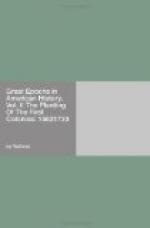There had been twenty human victims, Corey included; besides two dogs, their accomplices in the mysterious crime. Fifty persons had obtained a pardon by confessing; a hundred and fifty were in prison awaiting trial; and charges had been made against two hundred more. The accusers were now flying at high quarries. Hezekiah Usher, known to the reader as an ancient magistrate of fair consideration, was complained of; and Mrs. Thacher, mother-in-law of Corwin, the justice who had taken the earliest examinations. Zeal in pushing forward the prosecution began to seem dangerous; for what was to prevent an accused person from securing himself by confession, and then revenging himself on the accuser by arraigning him as a former ally?...
The drunken fever-fit was now over, and with returning sobriety came profound contrition and disgust. A few still held out against the return of reason. There are some men who never own that they have been in the wrong, and a few men who are forever incapable of seeing it. Stoughton, with his bull-dog stubbornness, that might in other times have made him a St. Dominic, continued to insist that the business had been all right, and that the only mistake was in putting a stop to it. Cotton Mather was always infallible in his own eyes. In the year after the executions he had the satisfaction of studying another remarkable case of possession in Boston; but when it and the treatise which he wrote upon it failed to excite much attention, and it was plain that the tide had set the other way, he soon got his consent to let it run at its own pleasure, and turned his excursive activity to other objects....
Members of some of the juries, in a written public declaration, acknowledged the fault of their wrongful verdicts, entreated forgiveness, and protested that, “according to their present minds, they would none of them do such things again, on such grounds, for the whole world; praying that this act of theirs might be accepted in way of satisfaction for their offense.” A day of General Fasting was proclaimed by authority, to be observed throughout the jurisdiction, in which the people were invited to pray that “whatever mistakes on either hand had been fallen into, either by the body of this people, or by any orders of men, referring to the late tragedy raised among us by Satan and his instruments, through the awful judgment of God, he would humble them therefor, and pardon all the errors of his servants and people.”
[1] From Palfrey’s “History
of New England.” By permission of, and
by arrangement with, the authorized
publishers, Houghton, Miffin
Co. Copyright, 1873.
[2] Cotton Mather, son of
Increase Mather, the president of Harvard
College.
[3] This work was entitled
“Wonders of the Invisible World.”
It is
now much sought after by collectors
of Americana.




